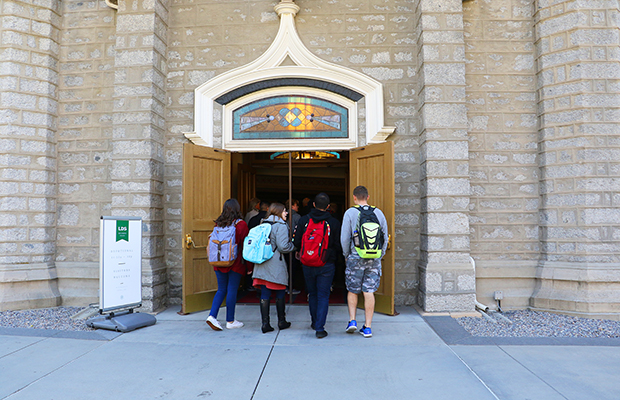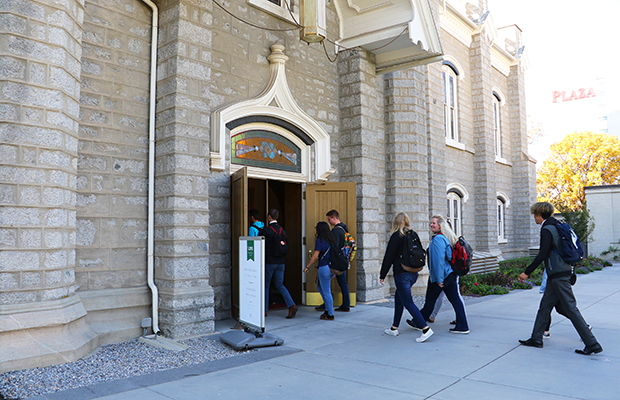Elder Pieper Teaches How You Can Approach Your Eternal Progress by Living Intentionally
Contributed By Valerie Johnson, Church News contributor

Elder Paul B. Pieper, General Authority Seventy, speaks during an LDS Business College devotional in the Assembly Hall on Temple Square on October 14, 2019. Photo by Valerie Johnson.
Article Highlights
- Commitment to daily discipleship becomes an effort to live intentionally.
- The gospel gives a perfect framework and values needed for intentional living.
“We live intentionally when we think deeply about why we do what we do, and make the conscious and deliberate effort to incorporate our beliefs and values into every aspect of our daily lives.” —Elder Paul B. Pieper, General Authority Seventy
Related Links
What does it mean to live an intentional life? And what are the dangers of living an unintentional one instead?
Inspired by the words of Elder Dieter F. Uchtdorf of the Quorum of the Twelve Apostles during last week’s general conference, Elder Paul B. Pieper, General Authority Seventy, spoke during an LDS Business College devotional October 15 about how the gospel can help each person live an intentional life.
God has established a pattern for the continuous growth and learning of His children, Elder Pieper said. The foundations of the pattern involve agency, knowledge, and choice.
Learning is essential to growth and progress on earth. “We are on the earth today because of the growth and progression that we experienced in our pre-mortal life,” Elder Pieper said. “Our progress there came because of the things we learned from our Heavenly Parents.”
The challenge and adventure in mortality is to continue the process of learning, growing, and developing, he taught. “Indeed, the richness and fullness of our mortal experiences will be determined by how well we use each of those circumstances we are placed in here to increase our knowledge of truth and act to apply those in our lives.”
Elder Pieper shared a quote from Elder Uchtdorf’s October 2019 general conference talk: “Remember that discipleship is not about doing things perfectly; it’s about doing things intentionally. It is your choices that show what you truly are, far more than your abilities” (“Your Great Adventure”).
Elder Pieper focused on the word “intentionally,” explaining that it means not leaving things to chance and to be conscious and deliberate. “We live intentionally when we think deeply about why we do what we do and make the conscious and deliberate effort to incorporate our beliefs and values into every aspect of our daily lives.”
Conversely, living unintentionally means going with the flow, responding to external influences, and passively surrendering to others’ ideas or values.
For instance, technology nowadays has created wonderful tools, like smartphones, that can help each person live an intentional life. However, he explained, “they’re also these tools that can take over our lives if we let them.”
Elder Pieper shared the story of a person who discovered what their unintentional living had cost them. This person signed up for Amazon Prime and soon began making small purchases every day. After several years of these convenient, habitual purchases, he couldn’t figure out why he was never able to go traveling with family and friends like he would have liked to do. Then he decided to look at the last four years of his purchases. He was shocked to discover that these small, thoughtless purchases had cost him thousands of dollars.

The Assembly hall on Temple Square in Salt Lake City, Utah, on October 14, 2019. LDS Business College students attended a devotional at the Assembly Hall. Photo by Kristin Murphy, Deseret News.
“In this true story, a bright and capable individual ceded his intentional life for an unintentional life,” Elder Pieper said. “It is hard not to do in today’s world.”
Does every person need to get rid of their social media, video games, and other things that can cause distraction?
“I’m saying you need to decide to use those tools intentionally.”
Those who choose an unintentional life, or don’t choose an intentional life, “you stop learning, you stop stretching, you stop growing, you stop deciding, and you stop being an agent,” he said. Instead, a person becomes an object to be acted upon.
He shared an example of a friend from his youth who decided to be unintentional with the gospel, go with the flow, just have fun, and get active again later. Forty years later, he has never pursued an education, attended the temple, or had his family sealed to him.
When someone lives unintentionally, progress stops, he said. “It stops temporarily and it stops spiritually. If we want to progress, we have to live intentionally every day.”
So how does someone live more intentionally?
Everyone will have to make that decision themselves, he said. However, “The gospel gives a perfect framework and values needed for intentional living.”
Each person who has been baptized and confirmed has accepted those values and truths, and witnessed that they are willing to become disciples of Jesus Christ. Commitment to daily discipleship becomes an effort to live intentionally.
Practically speaking, one way to live more intentionally is to “find the thing that we need to do to make our next step in progress,” Elder Pieper said.
Living intentionally means making changes, which means repenting.

LDS Business College students enter the Assembly Hall on Temple Square for a devotional on October 14, 2019. Photo by Valerie Johnson.
Think about a character issue or standard of the gospel that could be lived better, he said. Then study that topic during one’s daily scripture study and ponder the principles. “And then, after you’ve studied it and pondered it, write it down in your journal and then kneel down in your prayer and … explain to Him what you learned,” he said.
Then, he said, “Tell Him how you feel and what you want to do. … And then just wait and see what He tells you to do that day to take a step to help improve what you were discussing with Him.”
As an example of how this process can work for a specific gospel principle, Elder Pieper shared some of the many questions he has heard from members of the Church who are concerned about living the Word of Wisdom: “Is vaping OK? Is medical marijuana OK? Are energy drinks OK?”
“We’re never going to be able to put out a list of all the kosher foods for Latter-day Saints,” Elder Pieper said. But each person can study the Word of Wisdom, stop and think about his or her life, and write down the things the Spirit tells him or her to do.
“Some of those things might be eat three balanced meals, stop eating junk food, get more exercise, study dietary changes that would address a specific health risk or problem you’ve had, or figure out a way to feed your mind on more uplifting materials.”
Elder Pieper also urged caution to those who find questions online that are designed to destroy faith in Jesus Christ and His restored Church.

LDS Business College students enter the Assembly Hall on Temple Square for a devotional on October 14, 2019. Photo by Valerie Johnson.
“Don’t depend on those questions. You figure out the questions that are important to you.”
When someone blindly makes the questions on the internet and social media his or her own, “we cede our agency. We think as someone else wants us to think. That’s not living intentionally.”
On the other hand, studying scriptures and praying daily will generate inspired questions that drive daily progress and growth.
“I witness that we are able to live intentionally because of God’s plan and God’s laws,” Elder Pieper said in closing. “I witness that Jesus Christ and the Holy Ghost make it possible to be led in our learning and in our actions to help us progress and find joy in this mortal life.”

The LDS Business College Singers perform during a devotional on October 14, 2019. Photo by Valerie Johnson.

Elder Paul B. Pieper, General Authority Seventy, speaks during an LDS Business College devotional in the Assembly Hall on Temple Square on October 14, 2019. Photo by Valerie Johnson.
